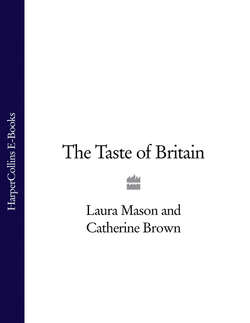Читать книгу The Taste of Britain - Hugh Fearnley-Whittingstall - Страница 62
HISTORY
ОглавлениеA Bath chap is the cheek of a pig, boned, brined and cooked. Why this delicacy should be associated with the town of Bath is not clear, except that it lies in an area which has been a centre of bacon curing.
Pig’s cheeks have probably been cured and dried for as long as any other part of the animal. The word chap is simply a variant on chop which, in the sixteenth century, meant the jaws and cheeks of an animal. These are probably what Mrs Raffald (1769) intended when she gave a recipe ‘To salt chops’ with salt, saltpetre, bay salt and brown sugar. This called for the meat to be dried afterwards; it would be expected to keep for several months. A century later, Mrs Beeton gave a method for drying and smoking pig’s cheeks, observing that A pig’s cheek, or Bath chap, will take about 2 hours after the water boils.’ Law’s Grocer’s Manual (c. 1895) notes both upper and lower jaws were used, the lower, which was meatier and contained the tongue, selling at about twice the price of the upper. Several manufacturers are recorded, including Hilliers of Stroud and the Wiltshire Bacon Company (founded at the end of the nineteenth century). However, today, only 2 producers have been located.
I am passionate about the use of local food and the high quality of produce to be found in Devon is one of the main reasons I chose to move here to start my latest venture. I have spent a lot of my time driving around the county, sourcing suppliers, going to farmers markets, visiting smallholders, speaking to day-boat fishermen and building up a network of people who are as passionate and mad about food as we are here at the New Angel. I love anticipating what produce is going to be brought into the restaurant on any given day. Take asparagus for example: because the season only lasts for six weeks, there is always an air of anticipation around their delivery. Devon asparagus is excellent and dishes containing my favourite vegetable always fly out of the door. Likewise, it’s great when Anthony Buscombe and his brother come straight in from their boat to the restaurant with a big box of freshly caught crab - 80 per cent of all of Britain’s crab comes from the Dartmouth and Salcombe coast, and it’s the best there is. The delicate, sweet meat needs only a little butter and spice, and I’m very lucky to be able to source such quality from my own doorstep. I regard this county as a centre of excellence for locally produced food. No other area can match Devon’s variety of produce, and that is why I believe it is so important to promote and support local food producers, suppliers and small farming businesses.
John Burton Race
CHEF AND PROPRIETOR, THE NEW ANGEL, DARTMOUTH
Bath chaps are eaten at main meals, usually with mustard. They are sold already cooked.
